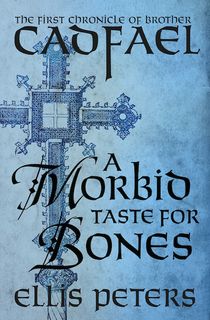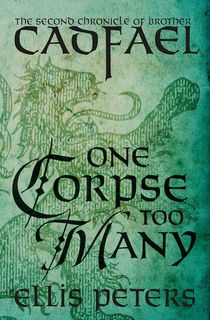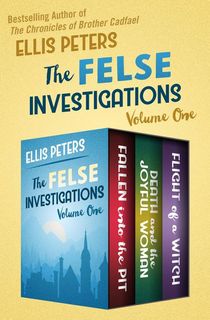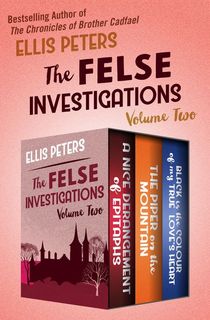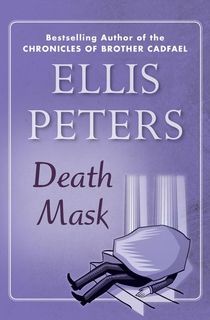FROM THE ARCHIVES: THIS STORY WAS FIRST PUBLISHED IN THE ARMCHAIR DETECTIVE VOL. 29 ISSUE 1, WINTER 1996.
Edith Pargeter graced us with her charm, humor, and enthusiasm, and love of words. For nearly 60 years she created new people and places which will live on in the hearts and minds of her many fans. It is no small feat to have spent a lifetime creating rather than destroying.
I first met Edith at a small, elegantly run hotel tucked away on a side street just yards away from Buckingham Palace. With sparkling eyes and a ready smile, Edith led us on a morning tea discussion that featured helpings of everything from true crimes to the drought in England, from London tourists to U.S. mystery bookstores, from the merchandising of Brother Cadfael to the funeral customs of Jews, Maoris, and every group in between; all served between generous dollops of history and social customs of England, Scotland, and Wales.
Related: America’s Queen of the British Mystery
The next time I saw her was in the hot, overcrowded second floor of a mystery bookshop located a few steps away from Carnegie Hall, the Russian Tea Room, and the Hard Rock Cafe. I watched her spend hours greeting people, drawing out those who were too awestruck to speak, sending everyone away with an autograph and a little gift of herself.
Edith, in fact, shared much more of her very private life with us than perhaps she realized. It was inevitable that three of her greatest loves–music, Czechoslovakia and India–would figure in her greatest love of all, writing. Through her work, we came to know and appreciate her essentially optimistic and gentle view of the world.
She invited us to ancient Rome, medieval Shrewsbury, and contemporary India and Czechoslovakia. She led trips to the seashore, the mountains, and the canals of Venice. She fought border skirmishes, an almost endless civil war, and World War II. She taught us about archaeology, opera, and heresy. She introduced us to kings and common soldiers, artists and writers, musicians and singers, very dumb criminals, and very smart ones, the occasional witch, a woman with a mid-life crisis, a vicious Nazi, countless young men coming of age, and countless young women helping them along. She has written capers, women-in-jeopardy, romantic suspense, historical fiction, and a travelog. She was a woman of many interests, much talent, and untold surprises.
On September 12, 1995, Edith suffered a stroke which paralyzed much of the right side of her body. It was to be the final illness thrust upon an indomitable spirit housed in a small but feisty body. Having already come through a fall which broke her back with nothing more than some slowness in her walk, and an illness with ultimately led to a partial amputation of her leg, Miss Pargeter told her friend and long-time agent Deborah Owen, “I’m ready, and you must understand that this is the best thing.”
She spent several weeks in the hospital, and then insisted upon returning home. She died quietly at 3:00 A.M. on October 14, 1995. Ms. Owen said, “Although we all tend to be selfish in such moments, it is important to know that she was prepared, and at peace.”
Edith Mary Pargeter was born the youngest of three in the village of Horsehay, Shropshire, on September 23, 1913. Her father was the head clerk at the local ironworks. Her elder brother, Edmund Ellis, was an engineer, and her middle sister married. She was profoundly influenced by her mother, who had written poetry but gave it up to raise three children, and never married herself, feeling that she could not both run a family and write–and for her the writing always came first.

Insofar as the intensely private lady talked about herself, Edith talked about a very happy childhood. Educated at Dawley Church of England Elementary School, and then on a scholarship at Coalbrookdale High School for Girls, she obtained an Oxford Higher School Certificate at first class honors in English. At age 20 she became a chemist’s assistant in Dawley, where she learned much that would help her over her years of writing.
Related: Remembering Mystery Author Joan Hess
Her earliest works included short stories and a short novel under her own names, and several novels under the name of Jolyon Carr, which were serialized in regional newspapers. She was to use other pseudonyms in her early career–as John Redfern she wrote a delightful mystery called The Victim Needs a Nurse, and as Peter Benedict she wrote Day Star, about a movie actress.
Just before the war she published her first full-length novel, The City Lies Foursquare (1939). When the war began she resigned from her job with the chemist and applied to the Women’s Royal Naval Service. The service didn’t deter her writing, and She Goes to War, about the WRNS, was published in 1942. The first volume of a trilogy about a common soldier’s war. The Eighth Champion of Christendom, also came out while she was still in uniform (1945), with the second book arriving just after (Reluctant Odyssey, 1946).
On V-E Day in 1944 Edith received the British Empire Medal, and she was demobilized as a Petty Officer on V-J Day, 1945.
The war years also helped form her lifelong connection with Czechoslovakian people, language and culture. She became very interested in their classics on the shelves of her friends, many of which had no translations. She began to read them with the help of dictionaries and written grammars and, finding that inadequate, started making her own translations of poetry and prose. In honor of her contribution to Czech literature, she received the Czechoslovak Society for International Relations Gold Medal in 1968, the award she remained most proud of through all the honors she received.
Her Czech contacts introduced her to India, where she went on for a long visit, and which served as the background for two novels.
Related: Means of Evil: Inside the Mind of Ruth Rendell
In 1951 Edith tried her first serious thriller in her own name, Fallen Into the Pit, which introduced the Felse family. In 1959 she developed her most famous pseudonym, Ellis Peters, upon completion of her second thriller in order to keep these works separate from her mainstream work. The Felse family reappeared in 1961, in the Edgar-winning Death and the Joyful Woman.
In the meantime, she continued to write historical novels. The Heaven Tree Trilogy remained the work that came the closest to what she had envisioned. However, she felt that her quartet of novels on the life of Prince Llewelyn ap Griffith, the first true prince of all Wales, The Brothers of Gwynedd Quartet, was her most important work.
By 1977 the idea for a thriller based on a true historical incident had been germinating for a while and A Morbid Taste for Bones was born. She had no intention of starting a series, but the siege and capture of Shrewsbury by King Stephen, and the massacre of the castle garrison, provided the germ of One Corpse Too Many. By that time Brother Cadfael had taken her over for good. Edith once said that the writing of the Cadfael novels had given her more pure pleasure than anything else she had done.
Edith believed her writing was bound to reflect some of the teachings of the Church of England. Cadfael’s optimism, tolerance, and occasional unorthodoxy were characteristics he shared with his creator. Although she maintained that there wasn’t much of herself in him, she did concede that he could have been “her better self.”
Related: What Is a Clerical Mystery?
Edith’s love for Shropshire formed a solid foundation for her life. She lived in the same early 1800s house for about 35 years, sharing it with her brother until his death. She memorialized him by taking his first name for her most famous pen name. (The last name, Peters, was a nod to a young friend named Petra, who was still a child when the name was chosen.) She cared deeply about the Abbey of Saint Peter and Saint Paul in the town of Shrewsbury. She was an ardent supporter of the Shrewsbury Quest, which shows life in a medieval abbey and also raised interest in the history of the town.
About her most beloved creation she said, “Cadfael opens channels for me to say, through him, things it would be difficult to say through a modern protagonist.”
The quality of Edith’s work has been recognized by both her readers and her peers throughout her lengthy career. Besides the Czechoslovak Society for International Relations Gold Medal, recommended by the Czechoslovak Writers’ Union, and the Best Novel Edgar for Death and the Joyful Woman, she also received the British Crime Writers’ Association Silver Daggers Award in 1981, and their Diamond Dagger Award in 1993. In 1994 she was awarded an O.B.E in the Queen’s New Year’s Honours list, and an honorary Master of Arts by Birmingham University. In 1995 she was the Guest of Honor at Malice Domestic VII, which she was unable to attend, and later in the year was named Grandmaster at Historicon I by her fellow historical mystery writers.
Those of us who had the pleasure of corresponding with her, or meeting her, will forever be changed by her kind touch, but one need not have met the person to know what was important to know about her–one need only read her books.
I will miss her and the books she had yet to write, but she will always be as close as my nearest bookshelf.
Sue Feder was an avid mystery reader and well-known Ellis Peters fan and authority. In 1988, she founded the Ellis Peters Appreciation Society and publishes the quarterly journal Most Loving Mere Folly devoted to the world of Ellis Peters and Edith Pargeter.
Featured photo: Alchetron

